Corporate Governance and Social Responsibility: A Comprehensive Report
VerifiedAdded on 2020/05/01
|15
|4842
|129
Report
AI Summary
This report provides an in-depth analysis of corporate governance and social responsibility, examining the shift from a shareholder-centric approach to a stakeholder-inclusive model. It explores the evolution of corporate responsibilities, the influence of technology, law, and societal expectations on modern corporations. The report reviews the perspectives of prominent figures like Milton Friedman and R. Edward Freeman, contrasting shareholder primacy with stakeholder theory. It delves into the benefits of adopting a stakeholder approach, including enhanced reputation, improved financial performance, and increased employee productivity. Furthermore, it discusses various theories of justice and stakeholder theories, offering recommendations for companies to effectively implement stakeholder strategies. The report covers literature reviews, limitations, and scope, providing a comprehensive overview of the topic.
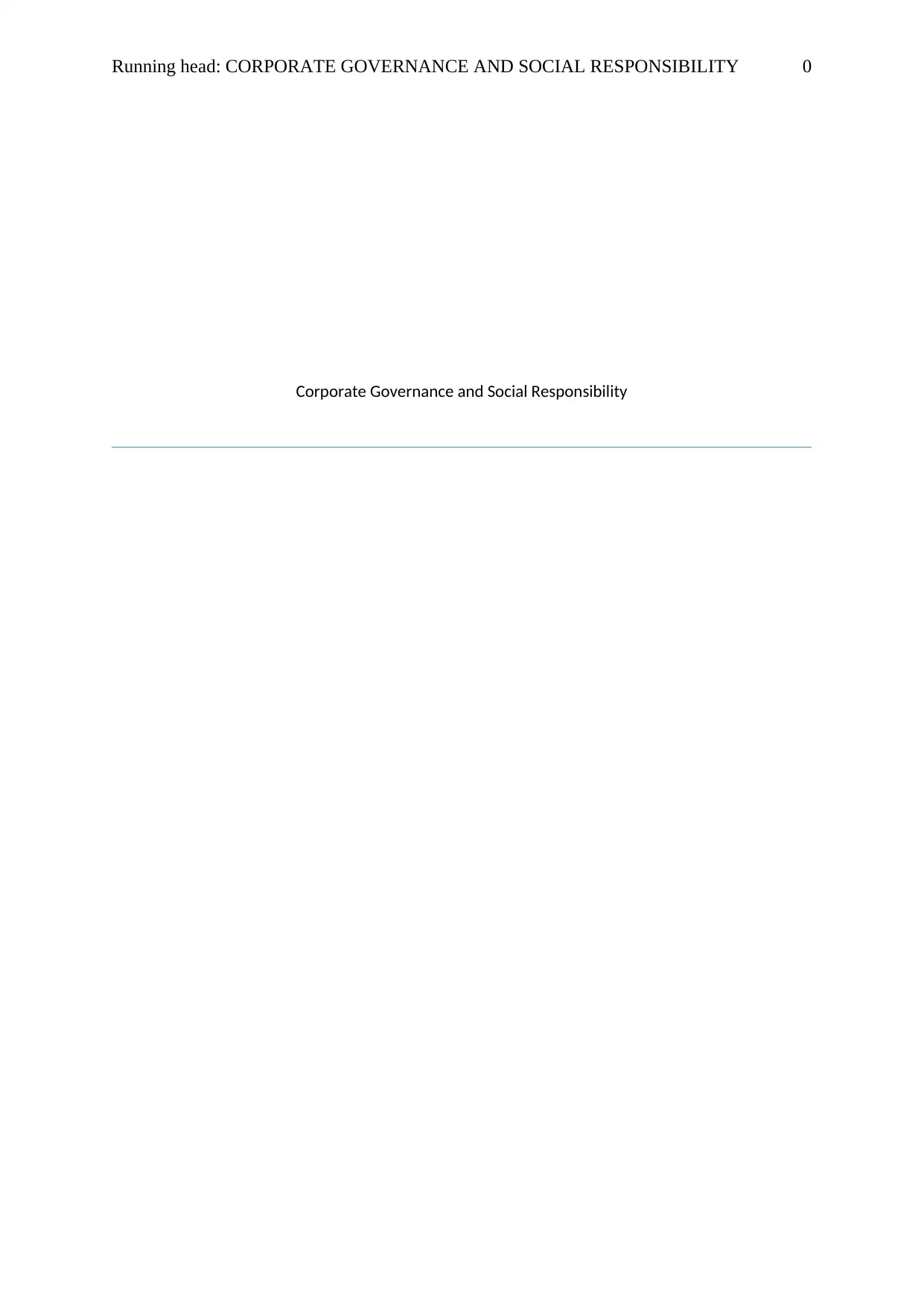
Running head: CORPORATE GOVERNANCE AND SOCIAL RESPONSIBILITY 0
Corporate Governance and Social Responsibility
Corporate Governance and Social Responsibility
Paraphrase This Document
Need a fresh take? Get an instant paraphrase of this document with our AI Paraphraser
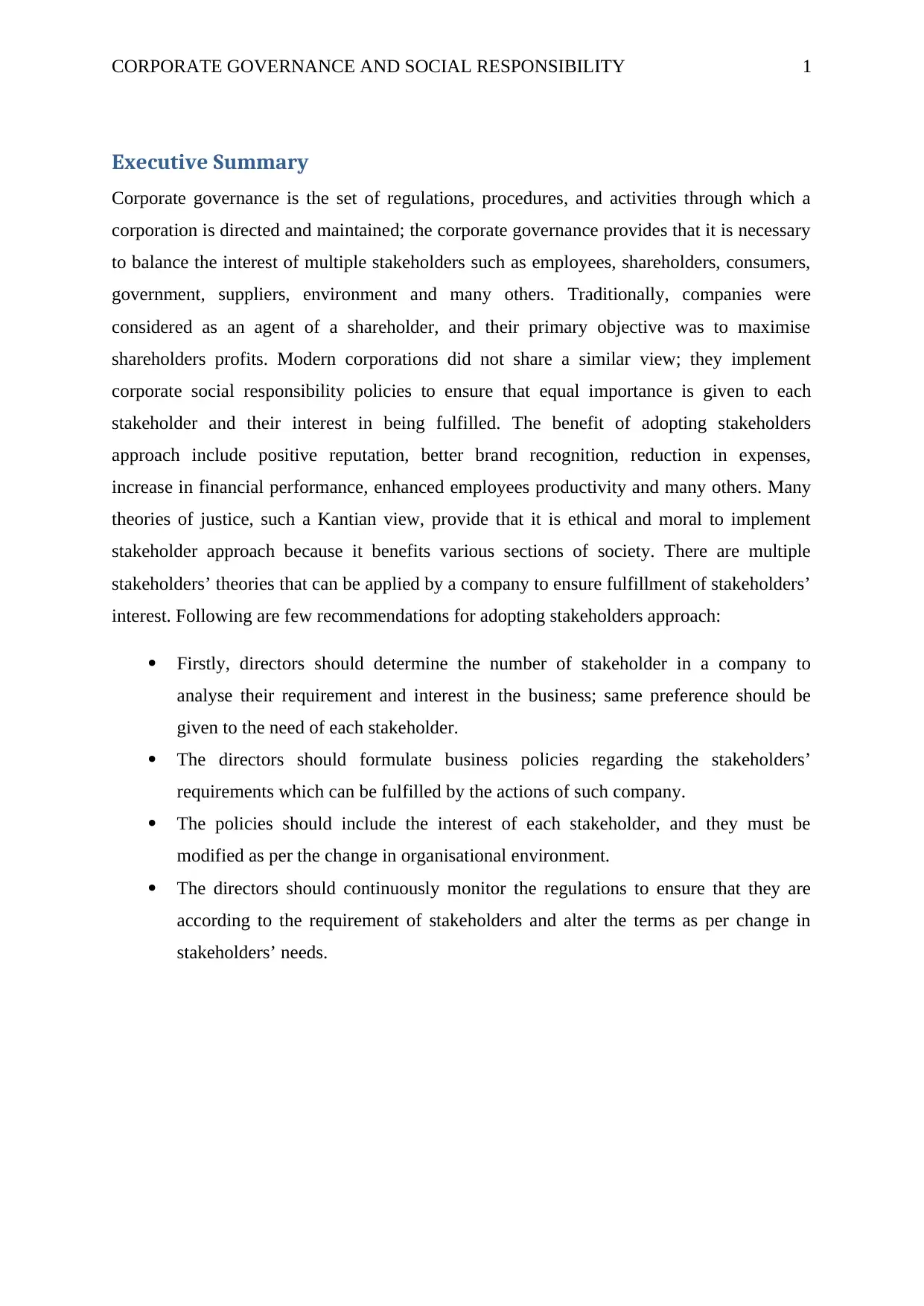
CORPORATE GOVERNANCE AND SOCIAL RESPONSIBILITY 1
Executive Summary
Corporate governance is the set of regulations, procedures, and activities through which a
corporation is directed and maintained; the corporate governance provides that it is necessary
to balance the interest of multiple stakeholders such as employees, shareholders, consumers,
government, suppliers, environment and many others. Traditionally, companies were
considered as an agent of a shareholder, and their primary objective was to maximise
shareholders profits. Modern corporations did not share a similar view; they implement
corporate social responsibility policies to ensure that equal importance is given to each
stakeholder and their interest in being fulfilled. The benefit of adopting stakeholders
approach include positive reputation, better brand recognition, reduction in expenses,
increase in financial performance, enhanced employees productivity and many others. Many
theories of justice, such a Kantian view, provide that it is ethical and moral to implement
stakeholder approach because it benefits various sections of society. There are multiple
stakeholders’ theories that can be applied by a company to ensure fulfillment of stakeholders’
interest. Following are few recommendations for adopting stakeholders approach:
Firstly, directors should determine the number of stakeholder in a company to
analyse their requirement and interest in the business; same preference should be
given to the need of each stakeholder.
The directors should formulate business policies regarding the stakeholders’
requirements which can be fulfilled by the actions of such company.
The policies should include the interest of each stakeholder, and they must be
modified as per the change in organisational environment.
The directors should continuously monitor the regulations to ensure that they are
according to the requirement of stakeholders and alter the terms as per change in
stakeholders’ needs.
Executive Summary
Corporate governance is the set of regulations, procedures, and activities through which a
corporation is directed and maintained; the corporate governance provides that it is necessary
to balance the interest of multiple stakeholders such as employees, shareholders, consumers,
government, suppliers, environment and many others. Traditionally, companies were
considered as an agent of a shareholder, and their primary objective was to maximise
shareholders profits. Modern corporations did not share a similar view; they implement
corporate social responsibility policies to ensure that equal importance is given to each
stakeholder and their interest in being fulfilled. The benefit of adopting stakeholders
approach include positive reputation, better brand recognition, reduction in expenses,
increase in financial performance, enhanced employees productivity and many others. Many
theories of justice, such a Kantian view, provide that it is ethical and moral to implement
stakeholder approach because it benefits various sections of society. There are multiple
stakeholders’ theories that can be applied by a company to ensure fulfillment of stakeholders’
interest. Following are few recommendations for adopting stakeholders approach:
Firstly, directors should determine the number of stakeholder in a company to
analyse their requirement and interest in the business; same preference should be
given to the need of each stakeholder.
The directors should formulate business policies regarding the stakeholders’
requirements which can be fulfilled by the actions of such company.
The policies should include the interest of each stakeholder, and they must be
modified as per the change in organisational environment.
The directors should continuously monitor the regulations to ensure that they are
according to the requirement of stakeholders and alter the terms as per change in
stakeholders’ needs.
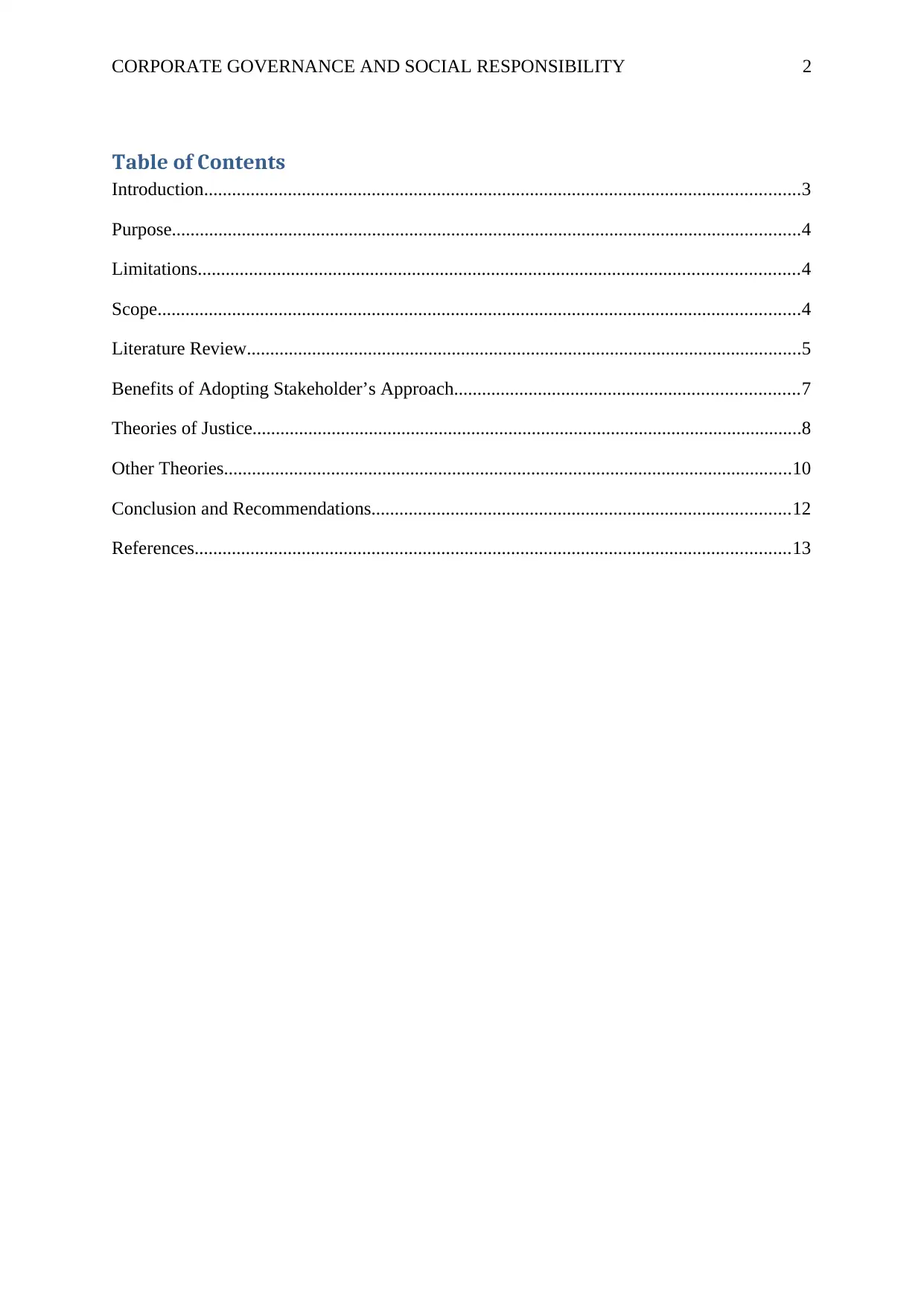
CORPORATE GOVERNANCE AND SOCIAL RESPONSIBILITY 2
Table of Contents
Introduction................................................................................................................................3
Purpose.......................................................................................................................................4
Limitations.................................................................................................................................4
Scope..........................................................................................................................................4
Literature Review.......................................................................................................................5
Benefits of Adopting Stakeholder’s Approach..........................................................................7
Theories of Justice......................................................................................................................8
Other Theories..........................................................................................................................10
Conclusion and Recommendations..........................................................................................12
References................................................................................................................................13
Table of Contents
Introduction................................................................................................................................3
Purpose.......................................................................................................................................4
Limitations.................................................................................................................................4
Scope..........................................................................................................................................4
Literature Review.......................................................................................................................5
Benefits of Adopting Stakeholder’s Approach..........................................................................7
Theories of Justice......................................................................................................................8
Other Theories..........................................................................................................................10
Conclusion and Recommendations..........................................................................................12
References................................................................................................................................13
⊘ This is a preview!⊘
Do you want full access?
Subscribe today to unlock all pages.

Trusted by 1+ million students worldwide
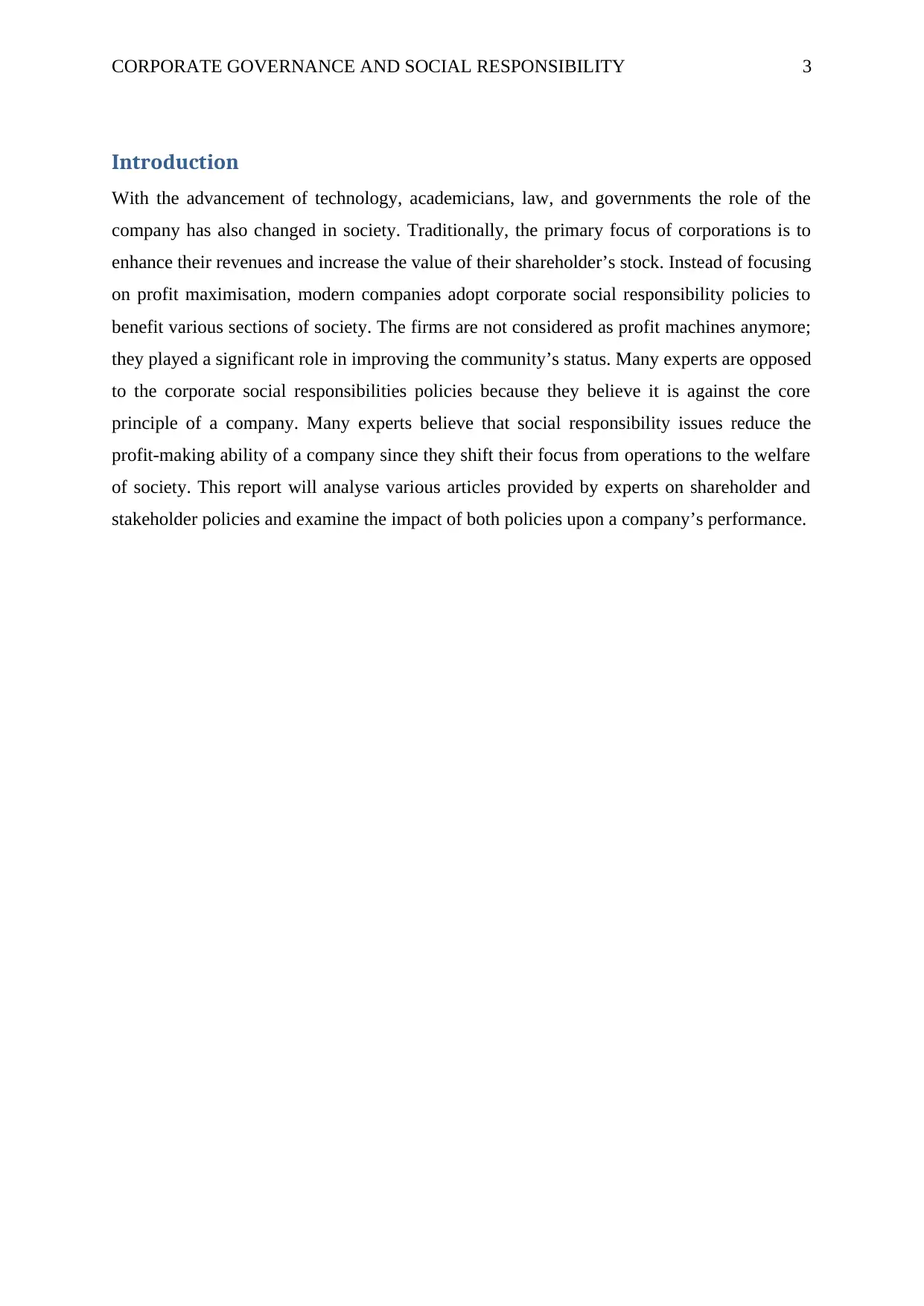
CORPORATE GOVERNANCE AND SOCIAL RESPONSIBILITY 3
Introduction
With the advancement of technology, academicians, law, and governments the role of the
company has also changed in society. Traditionally, the primary focus of corporations is to
enhance their revenues and increase the value of their shareholder’s stock. Instead of focusing
on profit maximisation, modern companies adopt corporate social responsibility policies to
benefit various sections of society. The firms are not considered as profit machines anymore;
they played a significant role in improving the community’s status. Many experts are opposed
to the corporate social responsibilities policies because they believe it is against the core
principle of a company. Many experts believe that social responsibility issues reduce the
profit-making ability of a company since they shift their focus from operations to the welfare
of society. This report will analyse various articles provided by experts on shareholder and
stakeholder policies and examine the impact of both policies upon a company’s performance.
Introduction
With the advancement of technology, academicians, law, and governments the role of the
company has also changed in society. Traditionally, the primary focus of corporations is to
enhance their revenues and increase the value of their shareholder’s stock. Instead of focusing
on profit maximisation, modern companies adopt corporate social responsibility policies to
benefit various sections of society. The firms are not considered as profit machines anymore;
they played a significant role in improving the community’s status. Many experts are opposed
to the corporate social responsibilities policies because they believe it is against the core
principle of a company. Many experts believe that social responsibility issues reduce the
profit-making ability of a company since they shift their focus from operations to the welfare
of society. This report will analyse various articles provided by experts on shareholder and
stakeholder policies and examine the impact of both policies upon a company’s performance.
Paraphrase This Document
Need a fresh take? Get an instant paraphrase of this document with our AI Paraphraser
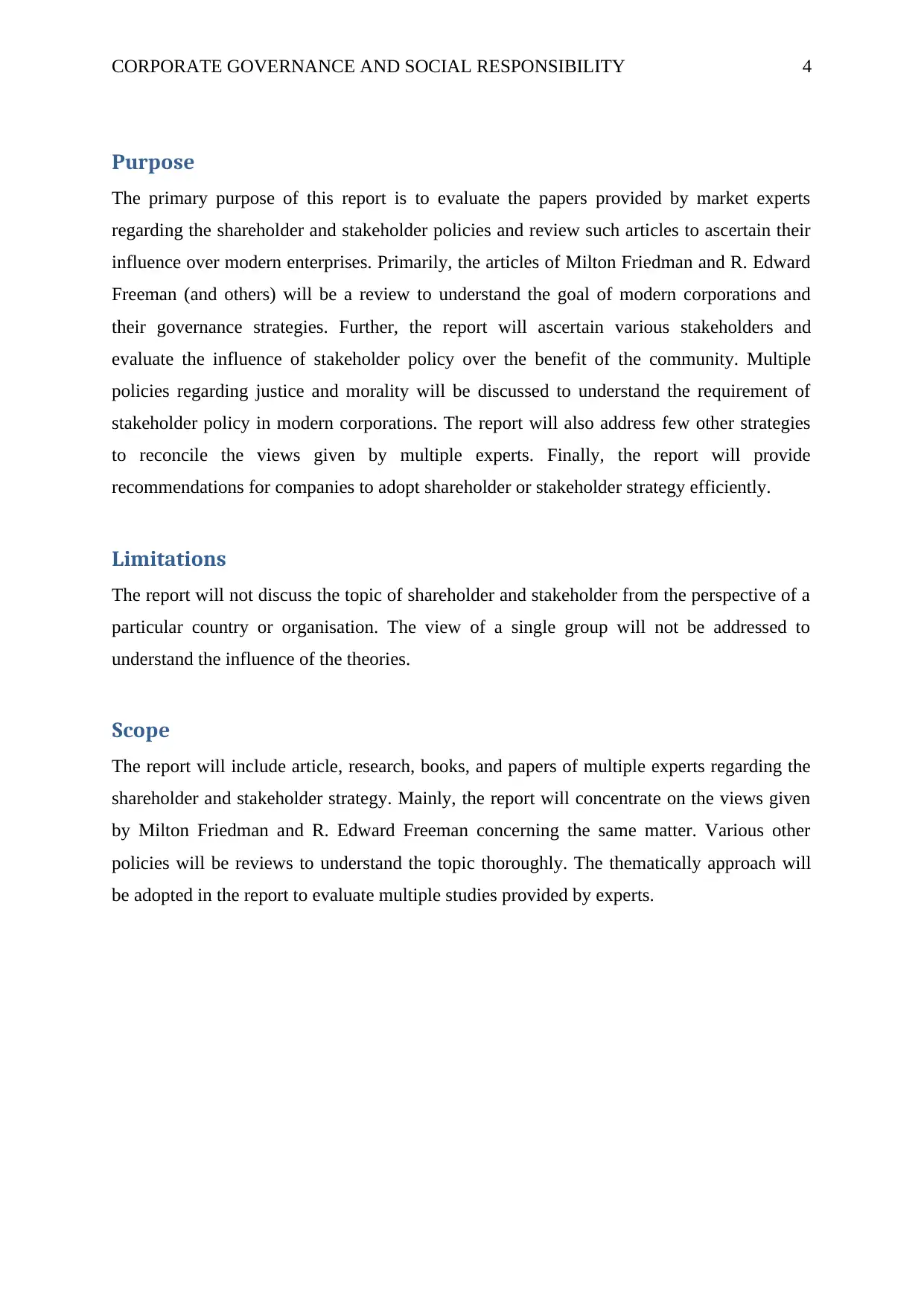
CORPORATE GOVERNANCE AND SOCIAL RESPONSIBILITY 4
Purpose
The primary purpose of this report is to evaluate the papers provided by market experts
regarding the shareholder and stakeholder policies and review such articles to ascertain their
influence over modern enterprises. Primarily, the articles of Milton Friedman and R. Edward
Freeman (and others) will be a review to understand the goal of modern corporations and
their governance strategies. Further, the report will ascertain various stakeholders and
evaluate the influence of stakeholder policy over the benefit of the community. Multiple
policies regarding justice and morality will be discussed to understand the requirement of
stakeholder policy in modern corporations. The report will also address few other strategies
to reconcile the views given by multiple experts. Finally, the report will provide
recommendations for companies to adopt shareholder or stakeholder strategy efficiently.
Limitations
The report will not discuss the topic of shareholder and stakeholder from the perspective of a
particular country or organisation. The view of a single group will not be addressed to
understand the influence of the theories.
Scope
The report will include article, research, books, and papers of multiple experts regarding the
shareholder and stakeholder strategy. Mainly, the report will concentrate on the views given
by Milton Friedman and R. Edward Freeman concerning the same matter. Various other
policies will be reviews to understand the topic thoroughly. The thematically approach will
be adopted in the report to evaluate multiple studies provided by experts.
Purpose
The primary purpose of this report is to evaluate the papers provided by market experts
regarding the shareholder and stakeholder policies and review such articles to ascertain their
influence over modern enterprises. Primarily, the articles of Milton Friedman and R. Edward
Freeman (and others) will be a review to understand the goal of modern corporations and
their governance strategies. Further, the report will ascertain various stakeholders and
evaluate the influence of stakeholder policy over the benefit of the community. Multiple
policies regarding justice and morality will be discussed to understand the requirement of
stakeholder policy in modern corporations. The report will also address few other strategies
to reconcile the views given by multiple experts. Finally, the report will provide
recommendations for companies to adopt shareholder or stakeholder strategy efficiently.
Limitations
The report will not discuss the topic of shareholder and stakeholder from the perspective of a
particular country or organisation. The view of a single group will not be addressed to
understand the influence of the theories.
Scope
The report will include article, research, books, and papers of multiple experts regarding the
shareholder and stakeholder strategy. Mainly, the report will concentrate on the views given
by Milton Friedman and R. Edward Freeman concerning the same matter. Various other
policies will be reviews to understand the topic thoroughly. The thematically approach will
be adopted in the report to evaluate multiple studies provided by experts.
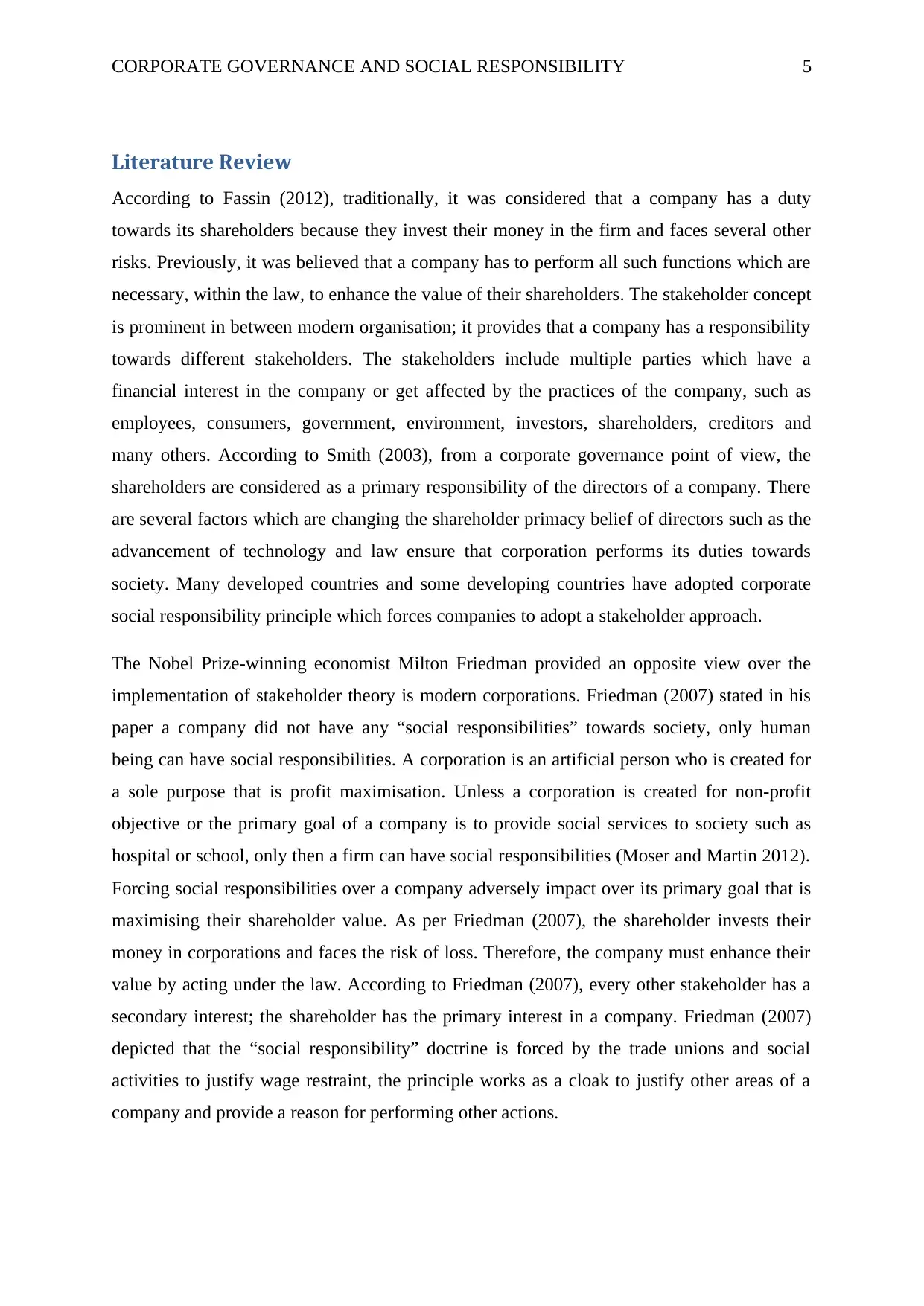
CORPORATE GOVERNANCE AND SOCIAL RESPONSIBILITY 5
Literature Review
According to Fassin (2012), traditionally, it was considered that a company has a duty
towards its shareholders because they invest their money in the firm and faces several other
risks. Previously, it was believed that a company has to perform all such functions which are
necessary, within the law, to enhance the value of their shareholders. The stakeholder concept
is prominent in between modern organisation; it provides that a company has a responsibility
towards different stakeholders. The stakeholders include multiple parties which have a
financial interest in the company or get affected by the practices of the company, such as
employees, consumers, government, environment, investors, shareholders, creditors and
many others. According to Smith (2003), from a corporate governance point of view, the
shareholders are considered as a primary responsibility of the directors of a company. There
are several factors which are changing the shareholder primacy belief of directors such as the
advancement of technology and law ensure that corporation performs its duties towards
society. Many developed countries and some developing countries have adopted corporate
social responsibility principle which forces companies to adopt a stakeholder approach.
The Nobel Prize-winning economist Milton Friedman provided an opposite view over the
implementation of stakeholder theory is modern corporations. Friedman (2007) stated in his
paper a company did not have any “social responsibilities” towards society, only human
being can have social responsibilities. A corporation is an artificial person who is created for
a sole purpose that is profit maximisation. Unless a corporation is created for non-profit
objective or the primary goal of a company is to provide social services to society such as
hospital or school, only then a firm can have social responsibilities (Moser and Martin 2012).
Forcing social responsibilities over a company adversely impact over its primary goal that is
maximising their shareholder value. As per Friedman (2007), the shareholder invests their
money in corporations and faces the risk of loss. Therefore, the company must enhance their
value by acting under the law. According to Friedman (2007), every other stakeholder has a
secondary interest; the shareholder has the primary interest in a company. Friedman (2007)
depicted that the “social responsibility” doctrine is forced by the trade unions and social
activities to justify wage restraint, the principle works as a cloak to justify other areas of a
company and provide a reason for performing other actions.
Literature Review
According to Fassin (2012), traditionally, it was considered that a company has a duty
towards its shareholders because they invest their money in the firm and faces several other
risks. Previously, it was believed that a company has to perform all such functions which are
necessary, within the law, to enhance the value of their shareholders. The stakeholder concept
is prominent in between modern organisation; it provides that a company has a responsibility
towards different stakeholders. The stakeholders include multiple parties which have a
financial interest in the company or get affected by the practices of the company, such as
employees, consumers, government, environment, investors, shareholders, creditors and
many others. According to Smith (2003), from a corporate governance point of view, the
shareholders are considered as a primary responsibility of the directors of a company. There
are several factors which are changing the shareholder primacy belief of directors such as the
advancement of technology and law ensure that corporation performs its duties towards
society. Many developed countries and some developing countries have adopted corporate
social responsibility principle which forces companies to adopt a stakeholder approach.
The Nobel Prize-winning economist Milton Friedman provided an opposite view over the
implementation of stakeholder theory is modern corporations. Friedman (2007) stated in his
paper a company did not have any “social responsibilities” towards society, only human
being can have social responsibilities. A corporation is an artificial person who is created for
a sole purpose that is profit maximisation. Unless a corporation is created for non-profit
objective or the primary goal of a company is to provide social services to society such as
hospital or school, only then a firm can have social responsibilities (Moser and Martin 2012).
Forcing social responsibilities over a company adversely impact over its primary goal that is
maximising their shareholder value. As per Friedman (2007), the shareholder invests their
money in corporations and faces the risk of loss. Therefore, the company must enhance their
value by acting under the law. According to Friedman (2007), every other stakeholder has a
secondary interest; the shareholder has the primary interest in a company. Friedman (2007)
depicted that the “social responsibility” doctrine is forced by the trade unions and social
activities to justify wage restraint, the principle works as a cloak to justify other areas of a
company and provide a reason for performing other actions.
⊘ This is a preview!⊘
Do you want full access?
Subscribe today to unlock all pages.

Trusted by 1+ million students worldwide
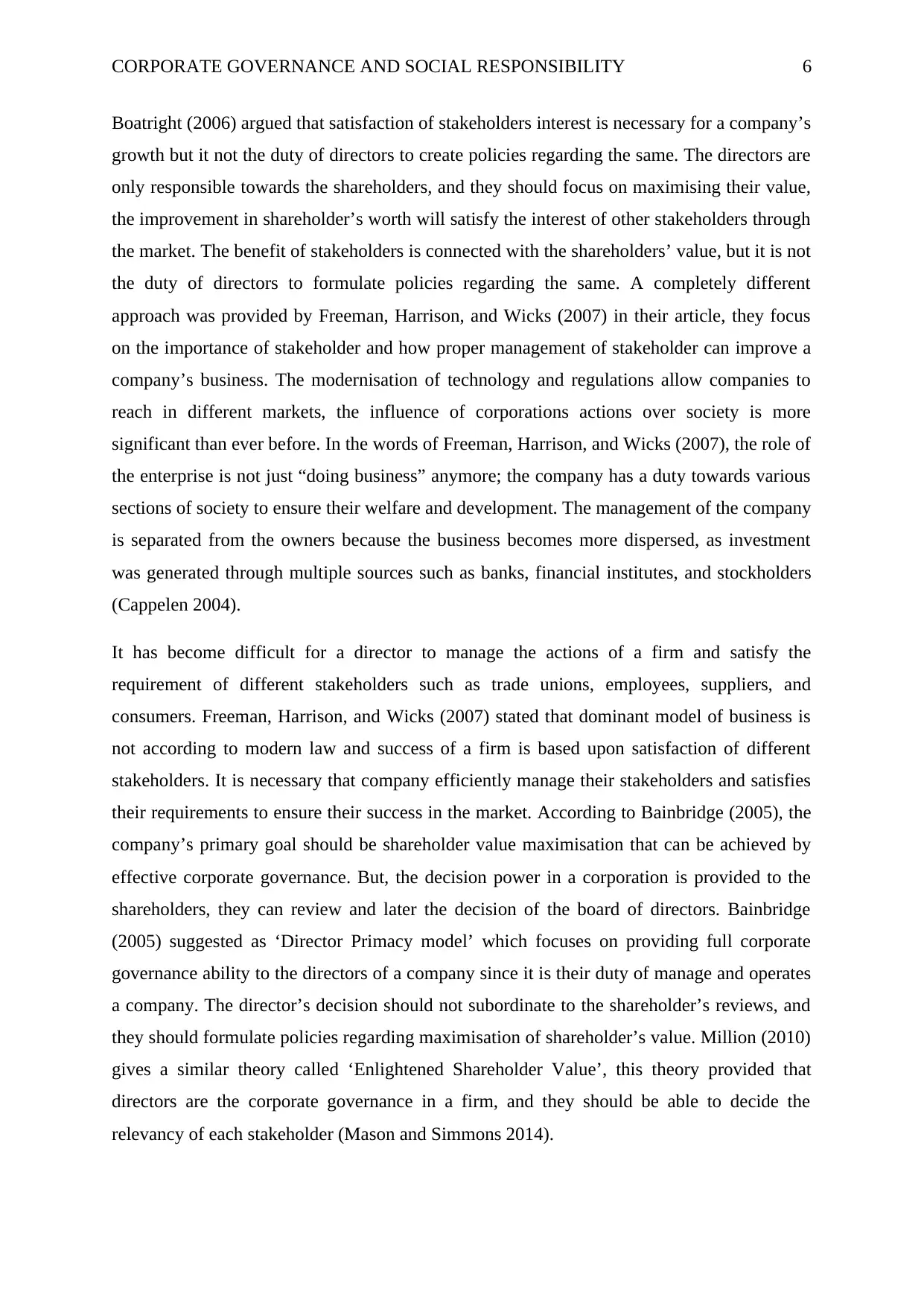
CORPORATE GOVERNANCE AND SOCIAL RESPONSIBILITY 6
Boatright (2006) argued that satisfaction of stakeholders interest is necessary for a company’s
growth but it not the duty of directors to create policies regarding the same. The directors are
only responsible towards the shareholders, and they should focus on maximising their value,
the improvement in shareholder’s worth will satisfy the interest of other stakeholders through
the market. The benefit of stakeholders is connected with the shareholders’ value, but it is not
the duty of directors to formulate policies regarding the same. A completely different
approach was provided by Freeman, Harrison, and Wicks (2007) in their article, they focus
on the importance of stakeholder and how proper management of stakeholder can improve a
company’s business. The modernisation of technology and regulations allow companies to
reach in different markets, the influence of corporations actions over society is more
significant than ever before. In the words of Freeman, Harrison, and Wicks (2007), the role of
the enterprise is not just “doing business” anymore; the company has a duty towards various
sections of society to ensure their welfare and development. The management of the company
is separated from the owners because the business becomes more dispersed, as investment
was generated through multiple sources such as banks, financial institutes, and stockholders
(Cappelen 2004).
It has become difficult for a director to manage the actions of a firm and satisfy the
requirement of different stakeholders such as trade unions, employees, suppliers, and
consumers. Freeman, Harrison, and Wicks (2007) stated that dominant model of business is
not according to modern law and success of a firm is based upon satisfaction of different
stakeholders. It is necessary that company efficiently manage their stakeholders and satisfies
their requirements to ensure their success in the market. According to Bainbridge (2005), the
company’s primary goal should be shareholder value maximisation that can be achieved by
effective corporate governance. But, the decision power in a corporation is provided to the
shareholders, they can review and later the decision of the board of directors. Bainbridge
(2005) suggested as ‘Director Primacy model’ which focuses on providing full corporate
governance ability to the directors of a company since it is their duty of manage and operates
a company. The director’s decision should not subordinate to the shareholder’s reviews, and
they should formulate policies regarding maximisation of shareholder’s value. Million (2010)
gives a similar theory called ‘Enlightened Shareholder Value’, this theory provided that
directors are the corporate governance in a firm, and they should be able to decide the
relevancy of each stakeholder (Mason and Simmons 2014).
Boatright (2006) argued that satisfaction of stakeholders interest is necessary for a company’s
growth but it not the duty of directors to create policies regarding the same. The directors are
only responsible towards the shareholders, and they should focus on maximising their value,
the improvement in shareholder’s worth will satisfy the interest of other stakeholders through
the market. The benefit of stakeholders is connected with the shareholders’ value, but it is not
the duty of directors to formulate policies regarding the same. A completely different
approach was provided by Freeman, Harrison, and Wicks (2007) in their article, they focus
on the importance of stakeholder and how proper management of stakeholder can improve a
company’s business. The modernisation of technology and regulations allow companies to
reach in different markets, the influence of corporations actions over society is more
significant than ever before. In the words of Freeman, Harrison, and Wicks (2007), the role of
the enterprise is not just “doing business” anymore; the company has a duty towards various
sections of society to ensure their welfare and development. The management of the company
is separated from the owners because the business becomes more dispersed, as investment
was generated through multiple sources such as banks, financial institutes, and stockholders
(Cappelen 2004).
It has become difficult for a director to manage the actions of a firm and satisfy the
requirement of different stakeholders such as trade unions, employees, suppliers, and
consumers. Freeman, Harrison, and Wicks (2007) stated that dominant model of business is
not according to modern law and success of a firm is based upon satisfaction of different
stakeholders. It is necessary that company efficiently manage their stakeholders and satisfies
their requirements to ensure their success in the market. According to Bainbridge (2005), the
company’s primary goal should be shareholder value maximisation that can be achieved by
effective corporate governance. But, the decision power in a corporation is provided to the
shareholders, they can review and later the decision of the board of directors. Bainbridge
(2005) suggested as ‘Director Primacy model’ which focuses on providing full corporate
governance ability to the directors of a company since it is their duty of manage and operates
a company. The director’s decision should not subordinate to the shareholder’s reviews, and
they should formulate policies regarding maximisation of shareholder’s value. Million (2010)
gives a similar theory called ‘Enlightened Shareholder Value’, this theory provided that
directors are the corporate governance in a firm, and they should be able to decide the
relevancy of each stakeholder (Mason and Simmons 2014).
Paraphrase This Document
Need a fresh take? Get an instant paraphrase of this document with our AI Paraphraser
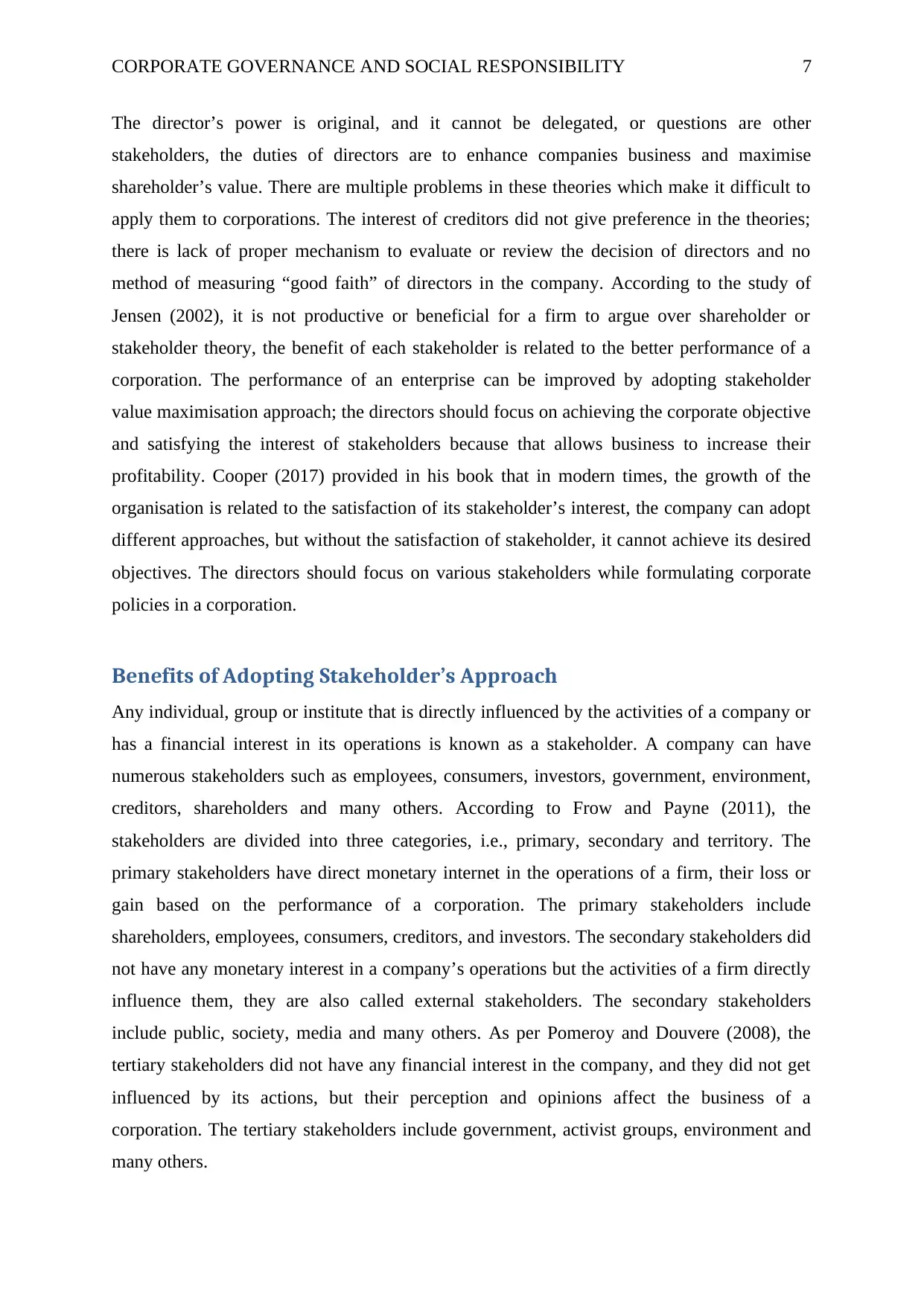
CORPORATE GOVERNANCE AND SOCIAL RESPONSIBILITY 7
The director’s power is original, and it cannot be delegated, or questions are other
stakeholders, the duties of directors are to enhance companies business and maximise
shareholder’s value. There are multiple problems in these theories which make it difficult to
apply them to corporations. The interest of creditors did not give preference in the theories;
there is lack of proper mechanism to evaluate or review the decision of directors and no
method of measuring “good faith” of directors in the company. According to the study of
Jensen (2002), it is not productive or beneficial for a firm to argue over shareholder or
stakeholder theory, the benefit of each stakeholder is related to the better performance of a
corporation. The performance of an enterprise can be improved by adopting stakeholder
value maximisation approach; the directors should focus on achieving the corporate objective
and satisfying the interest of stakeholders because that allows business to increase their
profitability. Cooper (2017) provided in his book that in modern times, the growth of the
organisation is related to the satisfaction of its stakeholder’s interest, the company can adopt
different approaches, but without the satisfaction of stakeholder, it cannot achieve its desired
objectives. The directors should focus on various stakeholders while formulating corporate
policies in a corporation.
Benefits of Adopting Stakeholder’s Approach
Any individual, group or institute that is directly influenced by the activities of a company or
has a financial interest in its operations is known as a stakeholder. A company can have
numerous stakeholders such as employees, consumers, investors, government, environment,
creditors, shareholders and many others. According to Frow and Payne (2011), the
stakeholders are divided into three categories, i.e., primary, secondary and territory. The
primary stakeholders have direct monetary internet in the operations of a firm, their loss or
gain based on the performance of a corporation. The primary stakeholders include
shareholders, employees, consumers, creditors, and investors. The secondary stakeholders did
not have any monetary interest in a company’s operations but the activities of a firm directly
influence them, they are also called external stakeholders. The secondary stakeholders
include public, society, media and many others. As per Pomeroy and Douvere (2008), the
tertiary stakeholders did not have any financial interest in the company, and they did not get
influenced by its actions, but their perception and opinions affect the business of a
corporation. The tertiary stakeholders include government, activist groups, environment and
many others.
The director’s power is original, and it cannot be delegated, or questions are other
stakeholders, the duties of directors are to enhance companies business and maximise
shareholder’s value. There are multiple problems in these theories which make it difficult to
apply them to corporations. The interest of creditors did not give preference in the theories;
there is lack of proper mechanism to evaluate or review the decision of directors and no
method of measuring “good faith” of directors in the company. According to the study of
Jensen (2002), it is not productive or beneficial for a firm to argue over shareholder or
stakeholder theory, the benefit of each stakeholder is related to the better performance of a
corporation. The performance of an enterprise can be improved by adopting stakeholder
value maximisation approach; the directors should focus on achieving the corporate objective
and satisfying the interest of stakeholders because that allows business to increase their
profitability. Cooper (2017) provided in his book that in modern times, the growth of the
organisation is related to the satisfaction of its stakeholder’s interest, the company can adopt
different approaches, but without the satisfaction of stakeholder, it cannot achieve its desired
objectives. The directors should focus on various stakeholders while formulating corporate
policies in a corporation.
Benefits of Adopting Stakeholder’s Approach
Any individual, group or institute that is directly influenced by the activities of a company or
has a financial interest in its operations is known as a stakeholder. A company can have
numerous stakeholders such as employees, consumers, investors, government, environment,
creditors, shareholders and many others. According to Frow and Payne (2011), the
stakeholders are divided into three categories, i.e., primary, secondary and territory. The
primary stakeholders have direct monetary internet in the operations of a firm, their loss or
gain based on the performance of a corporation. The primary stakeholders include
shareholders, employees, consumers, creditors, and investors. The secondary stakeholders did
not have any monetary interest in a company’s operations but the activities of a firm directly
influence them, they are also called external stakeholders. The secondary stakeholders
include public, society, media and many others. As per Pomeroy and Douvere (2008), the
tertiary stakeholders did not have any financial interest in the company, and they did not get
influenced by its actions, but their perception and opinions affect the business of a
corporation. The tertiary stakeholders include government, activist groups, environment and
many others.
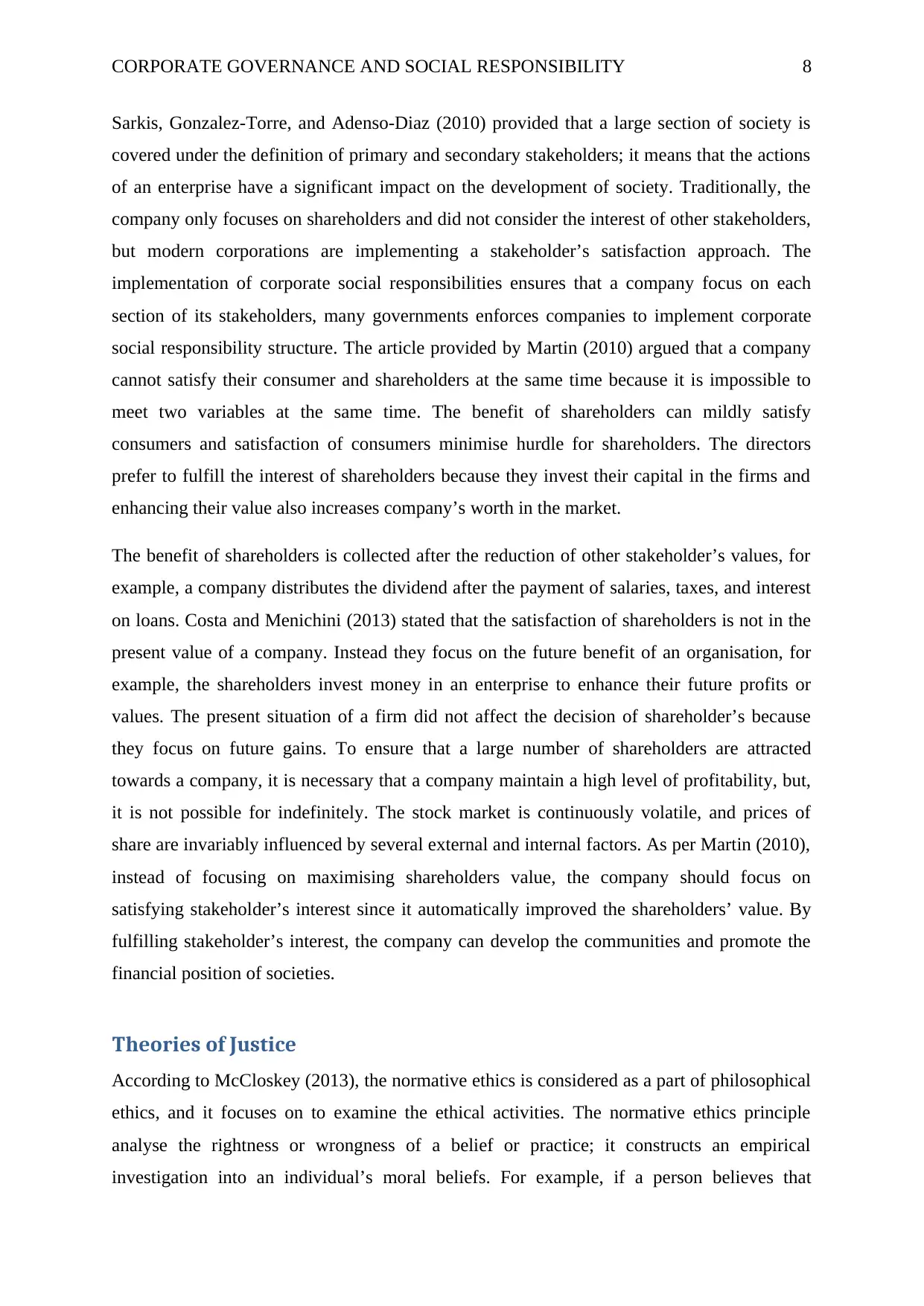
CORPORATE GOVERNANCE AND SOCIAL RESPONSIBILITY 8
Sarkis, Gonzalez-Torre, and Adenso-Diaz (2010) provided that a large section of society is
covered under the definition of primary and secondary stakeholders; it means that the actions
of an enterprise have a significant impact on the development of society. Traditionally, the
company only focuses on shareholders and did not consider the interest of other stakeholders,
but modern corporations are implementing a stakeholder’s satisfaction approach. The
implementation of corporate social responsibilities ensures that a company focus on each
section of its stakeholders, many governments enforces companies to implement corporate
social responsibility structure. The article provided by Martin (2010) argued that a company
cannot satisfy their consumer and shareholders at the same time because it is impossible to
meet two variables at the same time. The benefit of shareholders can mildly satisfy
consumers and satisfaction of consumers minimise hurdle for shareholders. The directors
prefer to fulfill the interest of shareholders because they invest their capital in the firms and
enhancing their value also increases company’s worth in the market.
The benefit of shareholders is collected after the reduction of other stakeholder’s values, for
example, a company distributes the dividend after the payment of salaries, taxes, and interest
on loans. Costa and Menichini (2013) stated that the satisfaction of shareholders is not in the
present value of a company. Instead they focus on the future benefit of an organisation, for
example, the shareholders invest money in an enterprise to enhance their future profits or
values. The present situation of a firm did not affect the decision of shareholder’s because
they focus on future gains. To ensure that a large number of shareholders are attracted
towards a company, it is necessary that a company maintain a high level of profitability, but,
it is not possible for indefinitely. The stock market is continuously volatile, and prices of
share are invariably influenced by several external and internal factors. As per Martin (2010),
instead of focusing on maximising shareholders value, the company should focus on
satisfying stakeholder’s interest since it automatically improved the shareholders’ value. By
fulfilling stakeholder’s interest, the company can develop the communities and promote the
financial position of societies.
Theories of Justice
According to McCloskey (2013), the normative ethics is considered as a part of philosophical
ethics, and it focuses on to examine the ethical activities. The normative ethics principle
analyse the rightness or wrongness of a belief or practice; it constructs an empirical
investigation into an individual’s moral beliefs. For example, if a person believes that
Sarkis, Gonzalez-Torre, and Adenso-Diaz (2010) provided that a large section of society is
covered under the definition of primary and secondary stakeholders; it means that the actions
of an enterprise have a significant impact on the development of society. Traditionally, the
company only focuses on shareholders and did not consider the interest of other stakeholders,
but modern corporations are implementing a stakeholder’s satisfaction approach. The
implementation of corporate social responsibilities ensures that a company focus on each
section of its stakeholders, many governments enforces companies to implement corporate
social responsibility structure. The article provided by Martin (2010) argued that a company
cannot satisfy their consumer and shareholders at the same time because it is impossible to
meet two variables at the same time. The benefit of shareholders can mildly satisfy
consumers and satisfaction of consumers minimise hurdle for shareholders. The directors
prefer to fulfill the interest of shareholders because they invest their capital in the firms and
enhancing their value also increases company’s worth in the market.
The benefit of shareholders is collected after the reduction of other stakeholder’s values, for
example, a company distributes the dividend after the payment of salaries, taxes, and interest
on loans. Costa and Menichini (2013) stated that the satisfaction of shareholders is not in the
present value of a company. Instead they focus on the future benefit of an organisation, for
example, the shareholders invest money in an enterprise to enhance their future profits or
values. The present situation of a firm did not affect the decision of shareholder’s because
they focus on future gains. To ensure that a large number of shareholders are attracted
towards a company, it is necessary that a company maintain a high level of profitability, but,
it is not possible for indefinitely. The stock market is continuously volatile, and prices of
share are invariably influenced by several external and internal factors. As per Martin (2010),
instead of focusing on maximising shareholders value, the company should focus on
satisfying stakeholder’s interest since it automatically improved the shareholders’ value. By
fulfilling stakeholder’s interest, the company can develop the communities and promote the
financial position of societies.
Theories of Justice
According to McCloskey (2013), the normative ethics is considered as a part of philosophical
ethics, and it focuses on to examine the ethical activities. The normative ethics principle
analyse the rightness or wrongness of a belief or practice; it constructs an empirical
investigation into an individual’s moral beliefs. For example, if a person believes that
⊘ This is a preview!⊘
Do you want full access?
Subscribe today to unlock all pages.

Trusted by 1+ million students worldwide
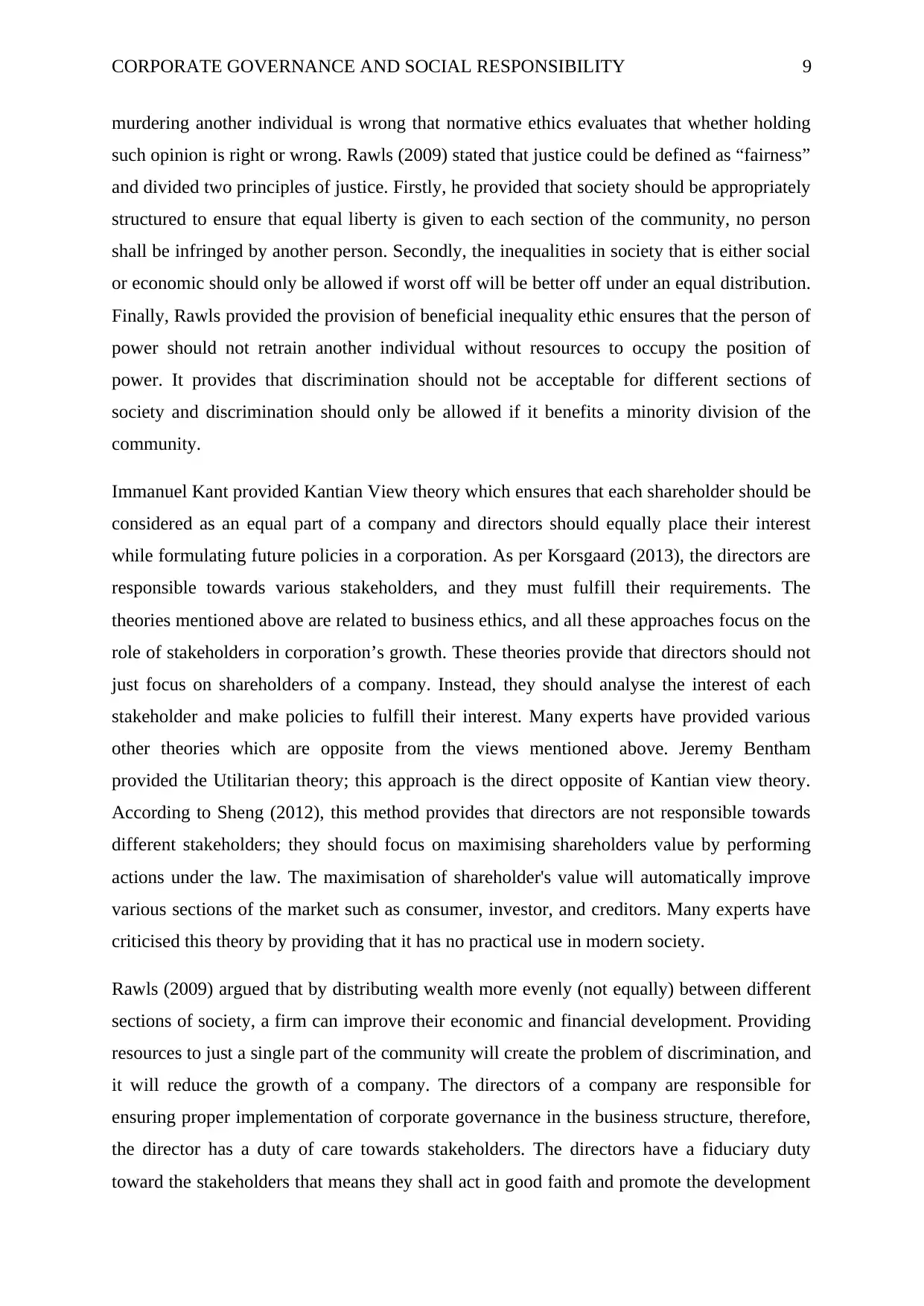
CORPORATE GOVERNANCE AND SOCIAL RESPONSIBILITY 9
murdering another individual is wrong that normative ethics evaluates that whether holding
such opinion is right or wrong. Rawls (2009) stated that justice could be defined as “fairness”
and divided two principles of justice. Firstly, he provided that society should be appropriately
structured to ensure that equal liberty is given to each section of the community, no person
shall be infringed by another person. Secondly, the inequalities in society that is either social
or economic should only be allowed if worst off will be better off under an equal distribution.
Finally, Rawls provided the provision of beneficial inequality ethic ensures that the person of
power should not retrain another individual without resources to occupy the position of
power. It provides that discrimination should not be acceptable for different sections of
society and discrimination should only be allowed if it benefits a minority division of the
community.
Immanuel Kant provided Kantian View theory which ensures that each shareholder should be
considered as an equal part of a company and directors should equally place their interest
while formulating future policies in a corporation. As per Korsgaard (2013), the directors are
responsible towards various stakeholders, and they must fulfill their requirements. The
theories mentioned above are related to business ethics, and all these approaches focus on the
role of stakeholders in corporation’s growth. These theories provide that directors should not
just focus on shareholders of a company. Instead, they should analyse the interest of each
stakeholder and make policies to fulfill their interest. Many experts have provided various
other theories which are opposite from the views mentioned above. Jeremy Bentham
provided the Utilitarian theory; this approach is the direct opposite of Kantian view theory.
According to Sheng (2012), this method provides that directors are not responsible towards
different stakeholders; they should focus on maximising shareholders value by performing
actions under the law. The maximisation of shareholder's value will automatically improve
various sections of the market such as consumer, investor, and creditors. Many experts have
criticised this theory by providing that it has no practical use in modern society.
Rawls (2009) argued that by distributing wealth more evenly (not equally) between different
sections of society, a firm can improve their economic and financial development. Providing
resources to just a single part of the community will create the problem of discrimination, and
it will reduce the growth of a company. The directors of a company are responsible for
ensuring proper implementation of corporate governance in the business structure, therefore,
the director has a duty of care towards stakeholders. The directors have a fiduciary duty
toward the stakeholders that means they shall act in good faith and promote the development
murdering another individual is wrong that normative ethics evaluates that whether holding
such opinion is right or wrong. Rawls (2009) stated that justice could be defined as “fairness”
and divided two principles of justice. Firstly, he provided that society should be appropriately
structured to ensure that equal liberty is given to each section of the community, no person
shall be infringed by another person. Secondly, the inequalities in society that is either social
or economic should only be allowed if worst off will be better off under an equal distribution.
Finally, Rawls provided the provision of beneficial inequality ethic ensures that the person of
power should not retrain another individual without resources to occupy the position of
power. It provides that discrimination should not be acceptable for different sections of
society and discrimination should only be allowed if it benefits a minority division of the
community.
Immanuel Kant provided Kantian View theory which ensures that each shareholder should be
considered as an equal part of a company and directors should equally place their interest
while formulating future policies in a corporation. As per Korsgaard (2013), the directors are
responsible towards various stakeholders, and they must fulfill their requirements. The
theories mentioned above are related to business ethics, and all these approaches focus on the
role of stakeholders in corporation’s growth. These theories provide that directors should not
just focus on shareholders of a company. Instead, they should analyse the interest of each
stakeholder and make policies to fulfill their interest. Many experts have provided various
other theories which are opposite from the views mentioned above. Jeremy Bentham
provided the Utilitarian theory; this approach is the direct opposite of Kantian view theory.
According to Sheng (2012), this method provides that directors are not responsible towards
different stakeholders; they should focus on maximising shareholders value by performing
actions under the law. The maximisation of shareholder's value will automatically improve
various sections of the market such as consumer, investor, and creditors. Many experts have
criticised this theory by providing that it has no practical use in modern society.
Rawls (2009) argued that by distributing wealth more evenly (not equally) between different
sections of society, a firm can improve their economic and financial development. Providing
resources to just a single part of the community will create the problem of discrimination, and
it will reduce the growth of a company. The directors of a company are responsible for
ensuring proper implementation of corporate governance in the business structure, therefore,
the director has a duty of care towards stakeholders. The directors have a fiduciary duty
toward the stakeholders that means they shall act in good faith and promote the development
Paraphrase This Document
Need a fresh take? Get an instant paraphrase of this document with our AI Paraphraser
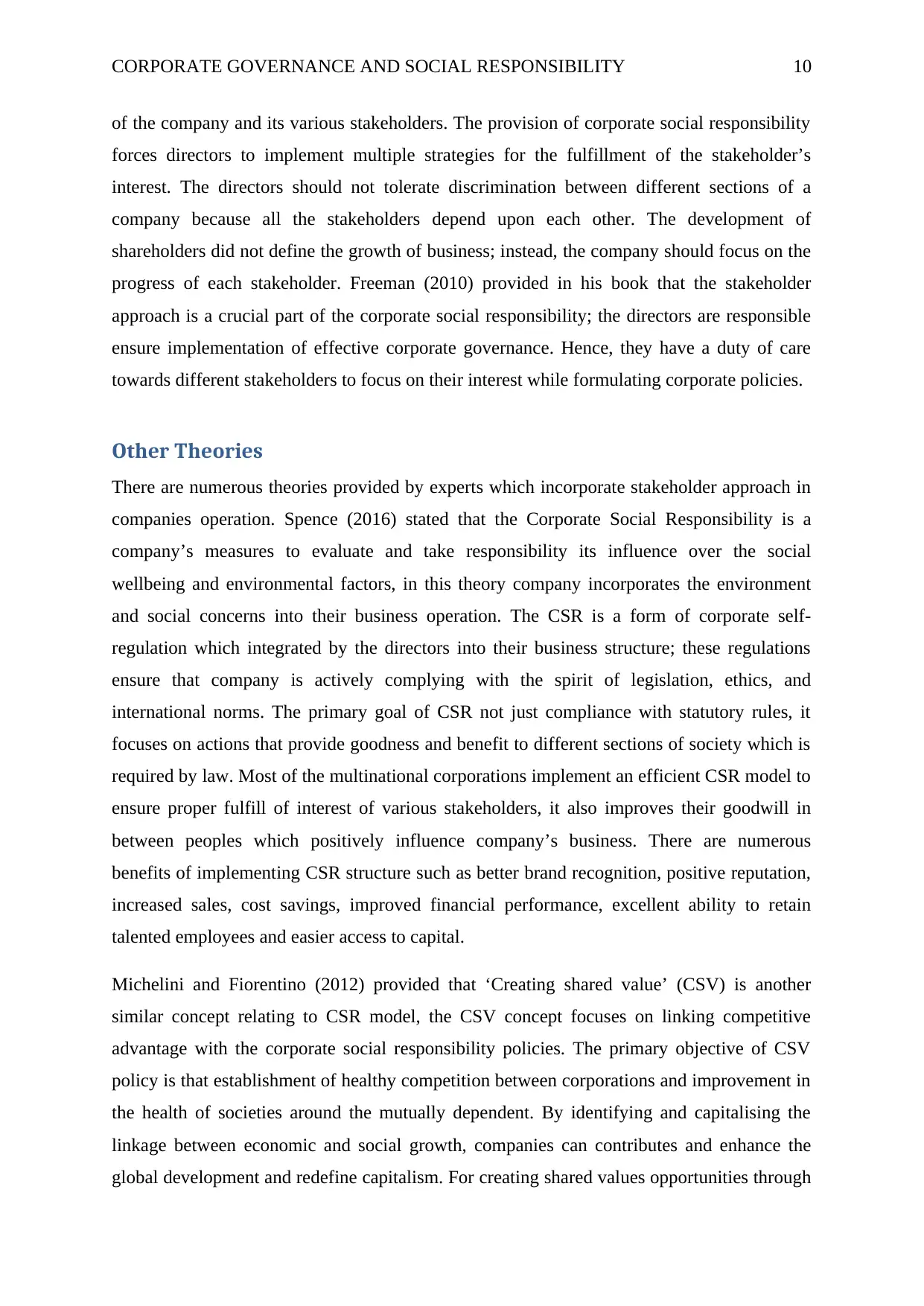
CORPORATE GOVERNANCE AND SOCIAL RESPONSIBILITY 10
of the company and its various stakeholders. The provision of corporate social responsibility
forces directors to implement multiple strategies for the fulfillment of the stakeholder’s
interest. The directors should not tolerate discrimination between different sections of a
company because all the stakeholders depend upon each other. The development of
shareholders did not define the growth of business; instead, the company should focus on the
progress of each stakeholder. Freeman (2010) provided in his book that the stakeholder
approach is a crucial part of the corporate social responsibility; the directors are responsible
ensure implementation of effective corporate governance. Hence, they have a duty of care
towards different stakeholders to focus on their interest while formulating corporate policies.
Other Theories
There are numerous theories provided by experts which incorporate stakeholder approach in
companies operation. Spence (2016) stated that the Corporate Social Responsibility is a
company’s measures to evaluate and take responsibility its influence over the social
wellbeing and environmental factors, in this theory company incorporates the environment
and social concerns into their business operation. The CSR is a form of corporate self-
regulation which integrated by the directors into their business structure; these regulations
ensure that company is actively complying with the spirit of legislation, ethics, and
international norms. The primary goal of CSR not just compliance with statutory rules, it
focuses on actions that provide goodness and benefit to different sections of society which is
required by law. Most of the multinational corporations implement an efficient CSR model to
ensure proper fulfill of interest of various stakeholders, it also improves their goodwill in
between peoples which positively influence company’s business. There are numerous
benefits of implementing CSR structure such as better brand recognition, positive reputation,
increased sales, cost savings, improved financial performance, excellent ability to retain
talented employees and easier access to capital.
Michelini and Fiorentino (2012) provided that ‘Creating shared value’ (CSV) is another
similar concept relating to CSR model, the CSV concept focuses on linking competitive
advantage with the corporate social responsibility policies. The primary objective of CSV
policy is that establishment of healthy competition between corporations and improvement in
the health of societies around the mutually dependent. By identifying and capitalising the
linkage between economic and social growth, companies can contributes and enhance the
global development and redefine capitalism. For creating shared values opportunities through
of the company and its various stakeholders. The provision of corporate social responsibility
forces directors to implement multiple strategies for the fulfillment of the stakeholder’s
interest. The directors should not tolerate discrimination between different sections of a
company because all the stakeholders depend upon each other. The development of
shareholders did not define the growth of business; instead, the company should focus on the
progress of each stakeholder. Freeman (2010) provided in his book that the stakeholder
approach is a crucial part of the corporate social responsibility; the directors are responsible
ensure implementation of effective corporate governance. Hence, they have a duty of care
towards different stakeholders to focus on their interest while formulating corporate policies.
Other Theories
There are numerous theories provided by experts which incorporate stakeholder approach in
companies operation. Spence (2016) stated that the Corporate Social Responsibility is a
company’s measures to evaluate and take responsibility its influence over the social
wellbeing and environmental factors, in this theory company incorporates the environment
and social concerns into their business operation. The CSR is a form of corporate self-
regulation which integrated by the directors into their business structure; these regulations
ensure that company is actively complying with the spirit of legislation, ethics, and
international norms. The primary goal of CSR not just compliance with statutory rules, it
focuses on actions that provide goodness and benefit to different sections of society which is
required by law. Most of the multinational corporations implement an efficient CSR model to
ensure proper fulfill of interest of various stakeholders, it also improves their goodwill in
between peoples which positively influence company’s business. There are numerous
benefits of implementing CSR structure such as better brand recognition, positive reputation,
increased sales, cost savings, improved financial performance, excellent ability to retain
talented employees and easier access to capital.
Michelini and Fiorentino (2012) provided that ‘Creating shared value’ (CSV) is another
similar concept relating to CSR model, the CSV concept focuses on linking competitive
advantage with the corporate social responsibility policies. The primary objective of CSV
policy is that establishment of healthy competition between corporations and improvement in
the health of societies around the mutually dependent. By identifying and capitalising the
linkage between economic and social growth, companies can contributes and enhance the
global development and redefine capitalism. For creating shared values opportunities through
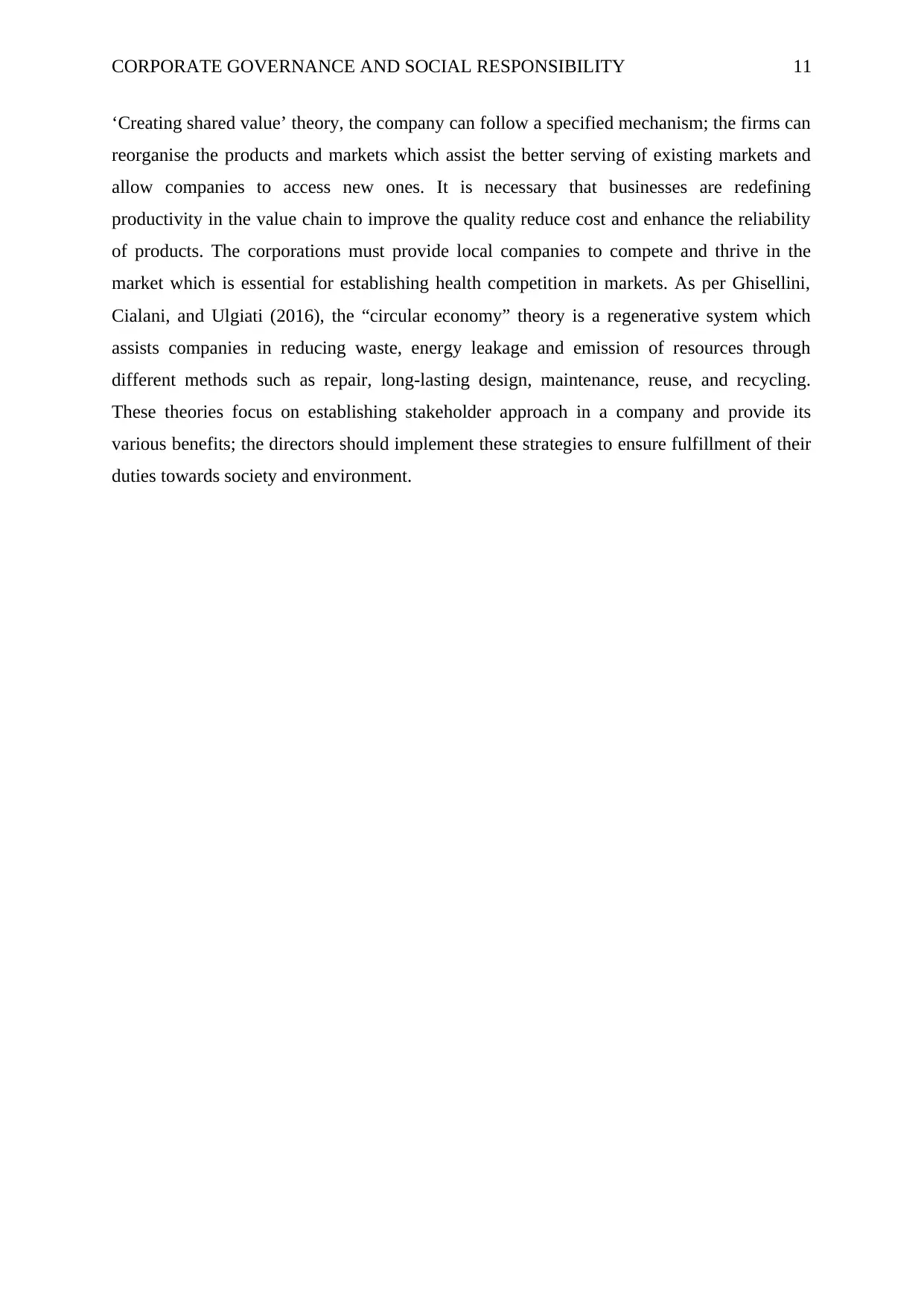
CORPORATE GOVERNANCE AND SOCIAL RESPONSIBILITY 11
‘Creating shared value’ theory, the company can follow a specified mechanism; the firms can
reorganise the products and markets which assist the better serving of existing markets and
allow companies to access new ones. It is necessary that businesses are redefining
productivity in the value chain to improve the quality reduce cost and enhance the reliability
of products. The corporations must provide local companies to compete and thrive in the
market which is essential for establishing health competition in markets. As per Ghisellini,
Cialani, and Ulgiati (2016), the “circular economy” theory is a regenerative system which
assists companies in reducing waste, energy leakage and emission of resources through
different methods such as repair, long-lasting design, maintenance, reuse, and recycling.
These theories focus on establishing stakeholder approach in a company and provide its
various benefits; the directors should implement these strategies to ensure fulfillment of their
duties towards society and environment.
‘Creating shared value’ theory, the company can follow a specified mechanism; the firms can
reorganise the products and markets which assist the better serving of existing markets and
allow companies to access new ones. It is necessary that businesses are redefining
productivity in the value chain to improve the quality reduce cost and enhance the reliability
of products. The corporations must provide local companies to compete and thrive in the
market which is essential for establishing health competition in markets. As per Ghisellini,
Cialani, and Ulgiati (2016), the “circular economy” theory is a regenerative system which
assists companies in reducing waste, energy leakage and emission of resources through
different methods such as repair, long-lasting design, maintenance, reuse, and recycling.
These theories focus on establishing stakeholder approach in a company and provide its
various benefits; the directors should implement these strategies to ensure fulfillment of their
duties towards society and environment.
⊘ This is a preview!⊘
Do you want full access?
Subscribe today to unlock all pages.

Trusted by 1+ million students worldwide
1 out of 15
Related Documents
Your All-in-One AI-Powered Toolkit for Academic Success.
+13062052269
info@desklib.com
Available 24*7 on WhatsApp / Email
![[object Object]](/_next/static/media/star-bottom.7253800d.svg)
Unlock your academic potential
Copyright © 2020–2025 A2Z Services. All Rights Reserved. Developed and managed by ZUCOL.




